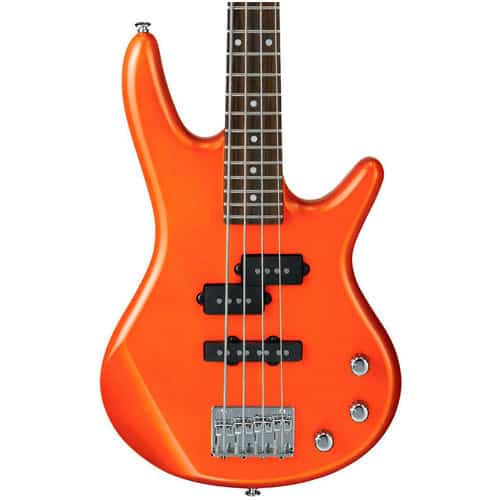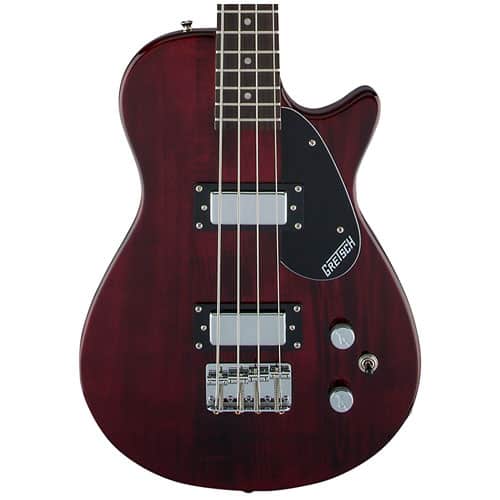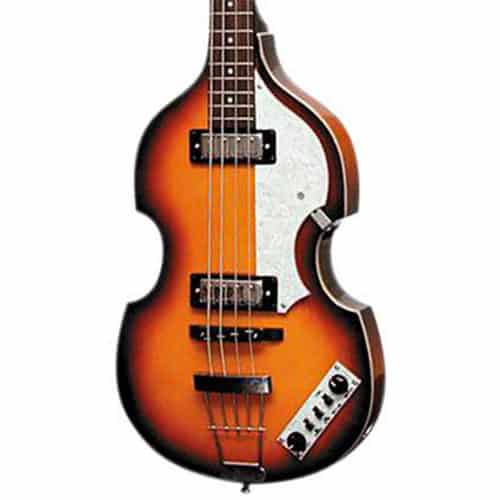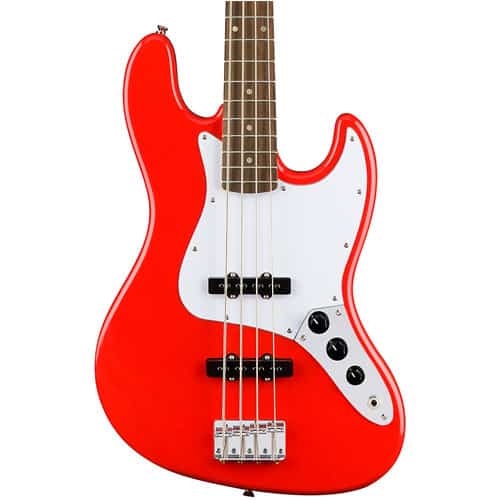Table of Contents
Short scale bass guitars are rising in popularity thanks to their compact style and easy playability.
Preferred by beginners and students alike, these models are also used by professional bassists for their portability and great sound.
The Fender Mustang PJ bass, hands down, is one of the best short scale bass guitars out there. Known for its tone and playability, this bass guitar’s P/J pickup design and offset styling make it a great all-rounder compared to the other models on our list.
The Fender Mustang may be our No. 1 pick, but that doesn’t mean there aren’t other short-scales worth considering. Let’s take a look at nine of the best short-scale guitars your money can buy.
The 9 Best Short Scale Bass Guitars:
| Image | Bass Guitars | Summary | Check Price |
|---|---|---|---|
 | Fender Mustang PJ Short-Scale Bass Guitar | Best Choice: P/J pickups and offset bass guitar body provide classic Fender tone and playability | Check price |
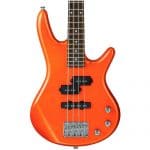 | Ibanez GSRM20 Mikro Short-Scale Bass Guitar | Best Value: Dual pickups, ultra-short scale length and lightweight poplar body provide big sound on a tight budget | Check price |
 | Gibson Les Paul Junior Tribute DC Short-Scale Bass | Premium Pick: Stripped-back rock machine that delivers top-notch sound and build quality | Check price |
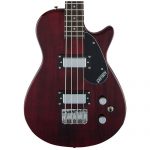 | Gretsch G2220 Short Scale Bass Guitar | Affordable Humbucking Short Scale: Mini humbuckers and walnut neck for balanced sound and feel | Check price |
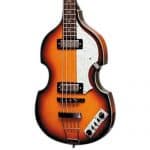 | Hofner Ignition Short-Scale Bass Guitar | Best Affordable Violin Bass: Nails the hollow-body sound and feel, from the original maker of Paul McCartney’s iconic bass | Check price |
 | Epiphone EB-0 Electric Short-Scale Bass | Best Gibson Alternative: A straightforward Gibson lookalike that delivers similar sound at a far more accessible price | Check price |
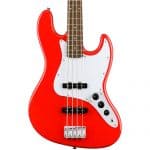 | Squier Affinity Bronco Bass Guitar | Ultra-Cheap Beginners Bass Guitar: Straightforward controls and classic Fender tones at a bargain price | Check price |
 | Dean EVO XM Short-Scale Bass Guitar | Best Lightweight Budget Bass: A smoothly contoured body for a lightweight feel with heavy tones | Check price |
Fender Mustang PJ Short-Scale Bass Guitar
Fender’s Mustang bass originated in the 1960s, but this modern edition offers a fresh spin on the vintage feel and sound. With a 30-inch scale length, this bass guitar offers short-scale tone and playability with full-size style.
The two pickups, arranged in a P/J configuration, are the main advantage of this bass. The design combines a Precision Bass pickup in the neck with a Jazz Bass pickup in the bridge. This offers you the tones of both classic basses in a package that you can blend at will.
An offset design adds some spice to the solid alder body, while the maple neck and pau ferro fretboard offer clear articulation and warm, supple tone.
The 9.5-inch fretboard radius pairs with medium jumbo frets to create smooth and accurate phrases. The neck also incorporates a modern “C” shape to maximize comfort for players of all styles and hand sizes.
Positives
- P/J pickup configuration offers the best of Fender’s bass lineup in one model
- 9.5-inch fingerboard radius and “C” shape neck offer fast, modern playing feel
Negatives
- Some users report dead notes or intonation problems with stock bridge
- Fretwork and nut angle stick out from neck on some models

Ibanez GSRM20 Mikro Short-Scale Bass Guitar
Ibanez’s GSRM20 Mikro is one of the smallest basses on our list, in both price and size. It’s a 28.6-inch short scale guitar, with a solid agathis body, maple neck and jatoba fretboard.
The body features a dual-pickup setup, with both Precision and Jazz bass pickups. These give you a wide range of tones for electric bass guitars, ranging from low and warm to bright and snappy. The tone and volume controls are simple but effective. When used together, they’re both responsive and intuitive.
The agathis body also makes this one of the lightest bass guitars around. It’s easy to pick up with one hand and carry for long distances. The extra-short scale is another plus. It’s helpful for musicians with small hands, who can’t stretch as far across the neck.
Positives
- P/J pickups offer broad, thumping sound for such an affordable short scale bass
- Extra-short scale and agathis body keep the Mikro super lightweight
Negatives
- Hardware (tuners and frets) can lead to issues with tuning and precision
- Pickups can sound muddy and lack clarity without tone controls turned up

Gibson Les Paul Junior Tribute DC Short-Scale Bass
The Les Paul Junior Tribute DC is a great fit for bass guitar players looking for a straight-ahead rock bass that provides the best sound quality and construction possible. With one humbucker pickup and a solid mahogany body, this bass is built for a rock-solid tone.
The single bassbucker pickup provides thick, punchy sounds whether played clean or with distortion. This tone meshes well with the 30.5-inch short scale length, which emphasizes the bass frequencies while cutting down on the overtones in each note.
You can also coil-tap the pickup for a single-coil sound. The single-coil mode emphasizes treble frequencies a bit more, which comes in handy for achieving a lighter and clearer tone.
The body is made from solid mahogany, without any binding or laminating to optimize sustain and looks. A rosewood fingerboard tops the maple neck, which provides a comfortable feel and injects a bit of extra warmth into your sound.
Positives
- Aggressive sound with plenty of attack for rock and metal players
- Solid mahogany body offers dynamic resonance and sustain
Negatives
- One pickup doesn’t offer as many tones when compared to two-pickup bass guitar models
- Fretboard feel and finish aren’t up to par for the price

Gretsch G2220 Short Scale Bass Guitar
Gretsch might not be a household name in the bass world, but its G2220 provides a unique vibe and outstanding sounds for players on a budget.
The body of this bass is made from basswood, a tonewood that provides a clean and balanced tonal profile. The maple neck and walnut fretboard balance each other, with emphasis on bright trebles and warm low-end for a well-rounded final sound.
Two mini-humbuckers form the electronic complement of this short scale unit. These pickups combine aspects of both single-coils and traditional humbuckers. In the G2220, they offer tones ranging from round, woody bass tones to bright and bouncy lead sounds.
The dual-pickup setup is another major plus. Compared to one-pickup bass guitars, this design offers you far more flexibility to choose your sound. It’s a versatile option for both rhythm work and bass solos.
Positives
- Mini humbuckers provide plenty of bottom end with bright accents
- Walnut fretboard and basswood body are durable and sound great
Negatives
- The sound might be too dark for lead bass playing
- The extra-small body might not be comfortable for taller bassists

Hofner Ignition Short-Scale Bass Guitar
Hofner-style violin basses were made famous by Paul McCartney and the Beatles. But while they nail the tones of the mid-1960s, these guitars are far more versatile than you might think. Hofner’s Ignition model delivers those classic elements and style at an affordable price.
The hollow body of the Ignition adds warm and airy qualities to the sound. Under certain conditions, it can even approach the dynamic touch of an upright bass. The spruce top, set maple neck and flame maple back and sides round out that sound as well.
And while the Ignition features a standard 30-inch scale length, its 42-mm nut width is much more narrow than many other short scale bass guitars. The compact rosewood fingerboard makes this bass comfortable for both newer bassists and players with small hands.
The pair of humbuckers help you achieve sounds like Paul McCartney and beyond. The neck pickup provides smooth and round, clean tones, while the bridge offers a bit more bite.
Positives
- The hollow body design provides a uniquely warm and woody tone for an electric bass
- Dual humbuckers cover a wide range of tones for all playing styles
Negatives
- Some players might prefer a chunkier neck for extra comfort
- The hollow body design doesn’t nail traditional “P-bass tone”

Epiphone EB-0 Electric Short-Scale Bass
The Epiphone EB-0 is a budget version of the Gibson EB-0, a short scale guitar model first introduced in the 1960s. The Epiphone bass keeps the classic features intact while delivering an accessible alternative for players without thousands of dollars to spend.
Like its high-end sibling, the Epiphone EB-0 includes one extra-wide humbucker mounted at the neck. This pickup emphasizes the low-end and mid-range for a growling, in-your-face sound. If you love rock, metal and even fuzz bass styles, the EB-0 won’t disappoint.
The guitar body is made from mahogany and finished in Gibson’s striking cherry red stain. The neck, meanwhile, uses maple with a rosewood fingerboard for a premium look and feel.
The volume controls and hardware are simple: just adjust the volume and tone knobs to find your perfect sound. The chrome bridge and tuning pegs help keep your bass guitar firmly in tune at all times.
Positives
- Offers the look, feel, and sound of a Gibson EB-0 without the hefty price tag
- Extra-wide humbucker handles distortion and fuzz well for a short scale bass
Negatives
- Pickup has issues detecting certain strings, particularly for slap bass players
- The solid mahogany body is very heavy for smaller or younger players to manage

Squier Affinity Bronco Bass Guitar
This Squier by Fender short scale bass incorporates Fender style and playability into a perfect beginner model. Compared to standard Fender models, it packs a few unique touches to make it better for new players.
The poplar guitar body features double cutaways and an offset contoured waist. This Squier by Fender design keeps the bass light and comfortable for long practice sessions.
The nut is also slightly narrower than a classic Precision Bass, which makes it easier to fret notes consistently and nail long stretches. The 9.5-inch fingerboard radius provides a fast-playing, modern feel.
The Bronco bass also features a custom-designed single-coil pickup. It delivers warm, round lows like a P-bass pickup, but if you dig in you can coax some sharper Jazz bass sounds out of it as well. Straightforward tone and volume controls get new players up and running quickly.
Positives
- Single-coil pickup offers sounds reminiscent of both P-basses and J-basses
- Lightweight body and narrower neck make it easy for new players to handle
Negatives
- Pickup can sound muddy and undefined with tone controls rolled off
- Medium jumbo frets aren’t as precise as on higher-end bass models

Dean EVO XM Short-Scale Bass Guitar
Dean’s EVO XM is one of the best short scale basses around for musicians who need a light guitar for jam sessions and gigs.
However, that doesn’t mean it has light or soft tones to go with the body weight.
This short scale guitar includes a set of two high-output humbuckers. These pickups excel at high gain levels for styles like metal and punk.
The neck and bridge setup also give you more tonal flexibility than a bass guitar with one pickup alone.
On the technical side, the EVO XM features a solid wood body with a maple neck and rosewood fretboard. These features provide excellent playability and give your tone a warm, luscious character.
Positives
- High-output pickups are tailored for hard rock and heavy metal
- The lightweight, short scale body design prioritizes comfort and playability
Negatives
- Neck and headstock are unbalanced, leading to neck drop
- Satin finish and gloss headstock leave something to be desired in looks

What is a Short Scale Bass Guitar?
Most standard electric bass guitars offer a scale somewhere around 34 inches long. A short scale bass is generally classified as having a scale length of 31 inches or shorter.
While short scale guitars might sound similar, the category covers a broad range of different models. The best ones can range from Fender-style, single-coil models to heavy, humbucking basses equipped for hard rock and metal. The versatility of these bass guitars is one of the main reasons why they’re so popular.
Body and Neck Differences
The only technical distinction between a full scale and short scale is the length.
Short-scale guitars are very popular with beginners and kids who are just starting out. But, it’s not just smaller musicians who prefer a more compact design, many bass players love them.
The lighter and smaller bass guitar bodies make them easier to play for long stretches. Whether you’re looking for a practice bass guitar for long sessions or gig in a band, the lower weight and smaller overall profile might come in handy.
The necks on short-scale guitars are also narrower than full-scale designs at the nut. This makes these guitar styles easier to fret. Narrower necks are more comfortable for new bass guitarists because they don’t have to reach as far around the neck to fret low notes.
Short scales also usually only come in four-string varieties (five-string and six-plus string models are usually full or long scale in design).
Is a Short Scale Bass Easier to Play?
Newbies may prefer short-scale bass guitars because they’re easier to play. The short scale length offers a few advantages, for example, string tension. The shorter your scale of bass guitar strings, the lower the bass guitar’s tension will be.
By lowering the tension, short-scale basses tend to feel easier on your fingers because the strings don’t offer as much resistance to fretting.
The looser feel also makes short scale guitars perfect for playing fast and complex lines. The best models reward bassists that have a light touch and enjoy quick, slinky runs.
Bends are also much easier.
Beyond the string feel, short scale bass guitars feature smaller-sized frets. The guitar’s overall scale length makes the frets more compact, to fit the same number of frets as a full scale bass guitar into a short scale guitar neck.
This makes the fretboard easier to navigate for bassists who can’t stretch their fingers as far across the scale length.
A scale bass guitar — whether short-scale or full-size — will also be easier to play than an upright or fretless bass guitar. For young musicians looking to learn bass guitar, an acoustic bass might not be as easy to start with compared to electric bass.
What is the Best Short Scale Bass Guitar?
While the basses mentioned above are certainly some of the best short-scale models around, we’ve mainly kept the models within a reasonable budget range.
If money is no object, you might want to check out some of these higher-end short scale guitars too:
Stanley Clarke is one of the pioneers of lead jazz bass playing. His Alembic signature bass guitar offers a premium ebony fingerboard, mahogany body and custom pickups for a flawless handmade experience. It’s great for upfront bass tones in fusion, jazz and even rock music.
Birdsong’s Corto2 bass guitar is another custom-built model. Its 31-inch scale provides a slightly thicker feel. It’s also equipped with both a single-coil and a humbucker pickup, and it’s built with top-notch tonewoods like mahogany, rosewood and maple. It’s hard for gigging musicians who need versatility to beat this package.
Finally, the Callowhill OBS guitar comes in both five- and six-string versions for more adventurous bassists. Two single-coil pickups pair with six built-in control knobs for the most precise playing experience out there. The high-mass bridge and decorated tiger maple neck provide extra high-end touches.
Does a Short Scale Bass Guitar Sound Different?
Short-scale basses aren’t completely different from full-scale basses, but they do offer a unique sound. The main distinction between the two instruments is with the amount of overtones in any one note.
Overtones are tied with the way a string vibrates when plucked. When you play any note, it sounds as a “fundamental,” which is called the “first harmonic.” However, the string also vibrates at other harmonic interval octaves above this note. Some instruments include more of those harmonics as well as the fundamental in each note. These notes are called “overtones.”
Shorter guitar models emphasize the fundamental of each note you play. That means your notes sound drier and punchier, without as many overtones. While this is great for many playing styles, it does sacrifice harmonic depth.
Full-size basses produce more overtones on any note. This makes their sound a bit more complex, and adds some harmonic nuance. However, these basses might not sound as “direct” or “up-front” as short-scale models do. Ultimately, both of these bass guitars have their advantages. It’s up to you to decide which works best for you.
Bottom Line
The Fender Mustang PJ is our No. 1 pick for the best short scale bass guitar in this roundup. Its versatile pickup design and timeless offset body shape provide an unbeatable combination of sound, style and value.
Bassists with a bit more cash to spend might also want to check out the Gibson Les Paul Junior DC. Its solid mahogany body and bassbucker pickup make it the perfect bass guitar for rock, hard rock and metal.
Do you prefer short-scale or full-scale guitars? Are some of these bass guitars on your wish list too? Let me know in the comments section down below.
If you prefer a traditional bass and are looking for a great instrument, check out our best bass guitars shootout.


